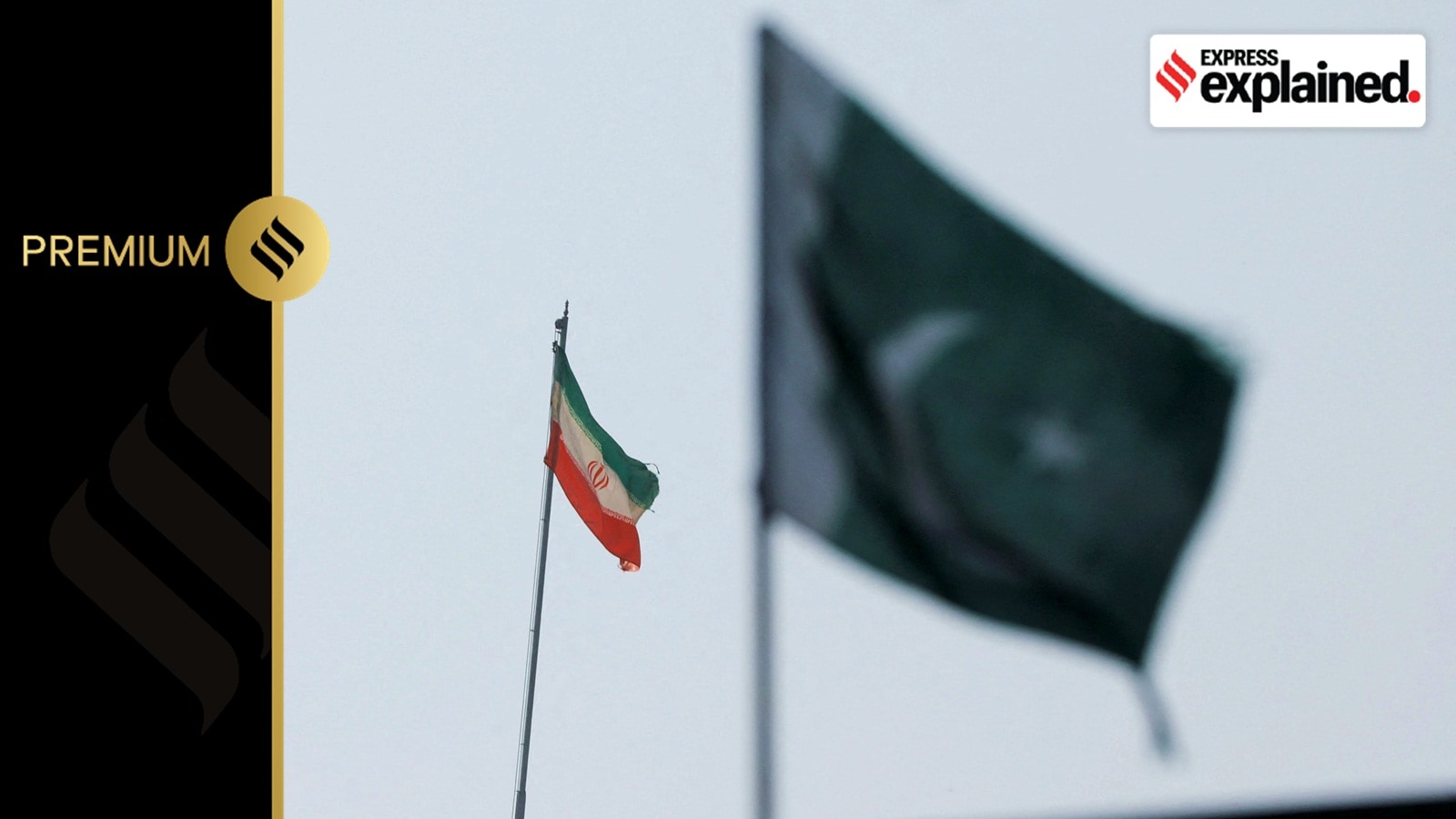Iran-Pakistan strikes: 5 reasons why India’s stakes deepen in the new Great Game
C Raja Mohan writes: Whether they want it or not, India, Pakistan, and Afghanistan will now be drawn deeper into the vortex of the turbulent Middle East. Five broad trends in security interdependence have come to the fore.
 The flag of Iran is seen over its consulate building in Karachi, with Pakistan's flag in the foreground, after the Pakistani foreign ministry said the country conducted strikes inside Iran targeting separatist militants, two days after Tehran said it attacked Israel-linked militant bases inside Pakistani territory. (REUTERS/Akhtar Soomro)
The flag of Iran is seen over its consulate building in Karachi, with Pakistan's flag in the foreground, after the Pakistani foreign ministry said the country conducted strikes inside Iran targeting separatist militants, two days after Tehran said it attacked Israel-linked militant bases inside Pakistani territory. (REUTERS/Akhtar Soomro)The tit-for-tat missile strikes between Iran and Pakistan this week, coming on top of the attacks on Indian shipping in the Red Sea, highlight the interconnected insecurities of the Subcontinent and the Gulf.
Although the geopolitics of the two regions have long been intertwined, this is the beginning of a phase in which the two regions will loom larger than ever before in the security calculus of each other.
Whether they want it or not, India, Pakistan, and Afghanistan will now be drawn deeper into the vortex of the turbulent Middle East.
Five broad trends in security interdependence have come to the fore.
First, the tragedy of the Baloch minorities, who straddle across Pakistan and Iran and are now targets of the attacks by Tehran and Rawalpindi, draws attention to the fragility of Pakistan’s western borderlands.
Dissident Baloch groups, with genuine grievances against both states, take shelter across the Pak-Iran border and intensify the security dilemmas of Tehran and Rawalpindi.
Second, beyond the bilateral, the dissident groups are caught up in regional power politics between Arabs, Israelis and Iranians. The ungoverned and under-governed spaces in the Baloch lands provide fertile ground for smuggling, narcotics trafficking, and cross-border political militancy backed by third parties.
The deepening conflict between Iran and its Arab neighbours on the one hand and Israel on the other breeds trans-border interventions. Pakistan has often accused India of meddling in Baloch affairs.
Third, beyond the regional, Balochistan’s geopolitical location – at the mouth of the oil-rich Gulf also makes it part of the new great game.
Pakistan’s difficulties in coping with the long-standing restiveness in Balochistan have been complicated by Beijing’s strategic presence in Gwadar, one of the critical nodes of the much-touted China-Pakistan Economic Corridor and a key Indian Ocean site for Chinese naval presence in the Arabian Sea.
Last September’s visit to Gwadar by David Blome, the US ambassador to Pakistan, has triggered speculation about Balochistan’s significance in the deepening rivalry between Washington and Beijing.
Fourth, Afghanistan and Iran have long had their share of problems with each other. Some of them have sharpened under the Taliban regimes, these include differences over religious ideology, minority rights, border management, and sharing transborder rivers, among others. The Taliban government in Kabul has demonstrated considerable assertiveness in dealing with Pakistan. It will be surprising if they do not seize the possibility of inserting itself into the Gulf to win new friends and expand its influence.
Fifth, the fragility of the Baloch frontier connecting South Asia and the Gulf, China’s strategic presence in Balochistan, and Beijing’s growing role in the Gulf are of deep concern to India. Delhi has traditionally stayed neutral in the conflicts within the Middle East. But Delhi might find it increasingly hard to do as India’s economic and security stakes rise in the volatile Middle East.
The attacks on its shipping in the Arabian Sea threaten its commercial lifelines, and unsurprisingly, India has deployed ten warships to protect its interests. India’s clear stand against terrorism, its close ties with Israel, and its deeper engagement with Saudi Arabia and the United Arab Emirates are all new elements of New Delhi’s Middle East policy.
In the colonial era, the undivided Subcontinent played a key role in shaping the security and political order in the Gulf. After independence and Partition, Pakistan claimed some of that role when it joined the Cold War alliances in the region. Today, a weakened Pakistan could increasingly become part of the widening conflict theatre in the Gulf.
The cross-border attacks between Iran and Pakistan point to a changing region that will demand India to rethink many of its past assumptions about security in the Middle East.
- 01
- 02
- 03
- 04
- 05






































